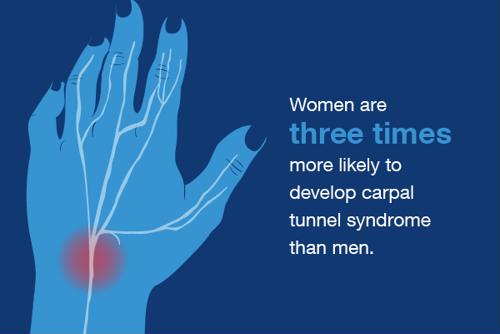
According to the American Academy of Orthopaedic Surgeons, carpal tunnel syndrome occurs when the median nerve, one of the major nerves in the hand is compressed. The median nerve travels from the neck down the arm to the fingers. The carpal tunnel is a passageway protecting the median nerve and flexor tendons.
When pressure is put on the carpal tunnel, the median nerve becomes overcrowded and can cause pain, numbness, weakness and a tingling sensation throughout the hand. While this condition is most commonly caused by repetitive hand use, other cases result from heredity, pregnancy, or other debilitating condition like diabetes or rheumatoid arthritis.
Here are a few alarming statistics about carpal tunnel syndrome you should know:
6 surprising statistics about CTS
- CTS impacts 4 to 10 million Americans, according to the Rheumatology Research Foundation.
- Middle-aged and older persons are more likely to live with the conditions than younger individuals. The average age of a person living with CTS is between 40 and 50 years old, according to the Virtual Medical Centre.
- Approximately 50 percent of CTS risk is determined by heredity.
- According to the National Institute of Neurological Disorders and Stroke, women are three times more likely to develop carpal tunnel syndrome than men, likely because their wrists tend to be smaller.
- Some individuals who undergo surgery gain grip and pinch strength 2 to 3 months later, but some people don't notice improvement until 6 to 12 months after surgery. However, 90 percent of patients find that surgery provided long-lasting relief from common symptoms of CTS.
- According to the Cleveland Clinic, carpal tunnel syndrome was first described in the mid-1800s and the first surgery was performed in the 1930s.
Tips for carpal tunnel syndrome pain management
If you're currently living with CTS or believe the condition could impact you in the future, consider one – or more – of the following options for pain management.
Take frequent breaks to let your wrists rest while at work, especially if you use your hands on the job all day.
Nerve gliding exercises also may be beneficial. Your doctor can recommend moves that are designed to help the median nerve move more freely, even if the carpal tunnel is compressed, according to the AAOS.
You may also consider talking to your manager about workplace ergonomics – there are various products from brands like IMAK Ergo that are designed with comfort and efficacy in mind for the office.
Instead of letting this condition keep you from completing your daily routine, try an IMAK RSI product for pain. The SmartGlove, for example, is designed to encourage proper hand and wrist position to help relieve and prevent wrist pain that's commonly associated with arthritis, tendonitis and CTS.
Check out Brownmed's IMAK Ergo and IMAK RSI products for more information on how to manage CTS pain today.
